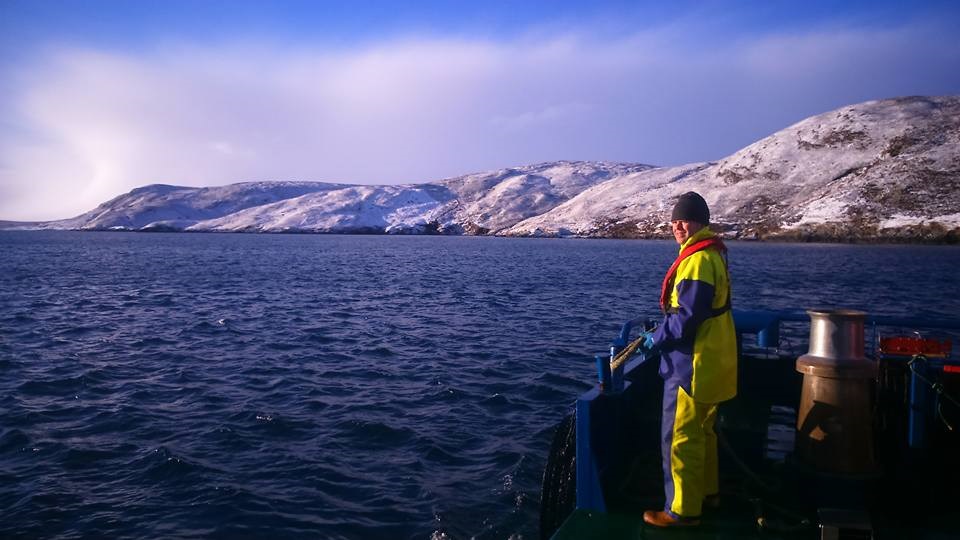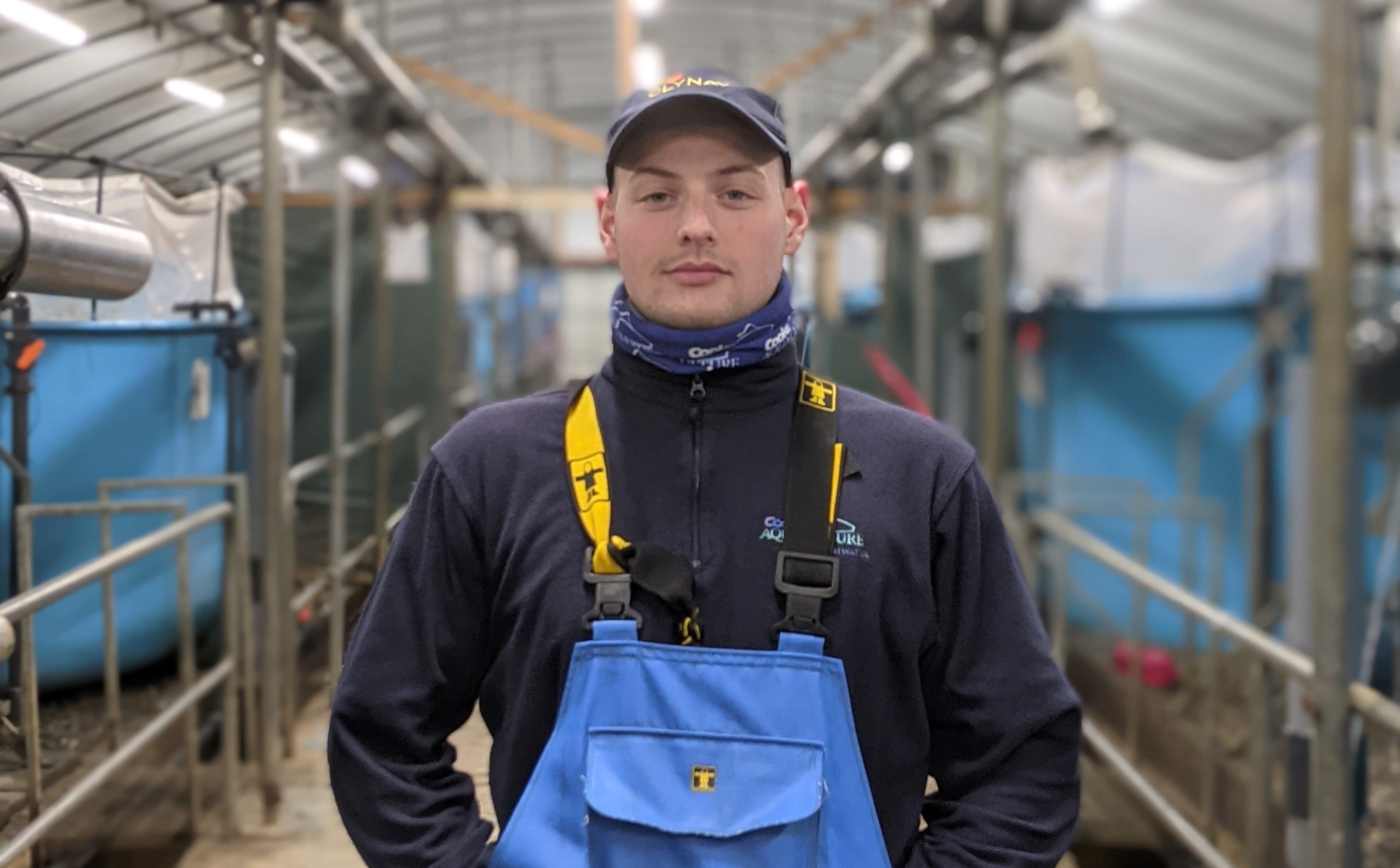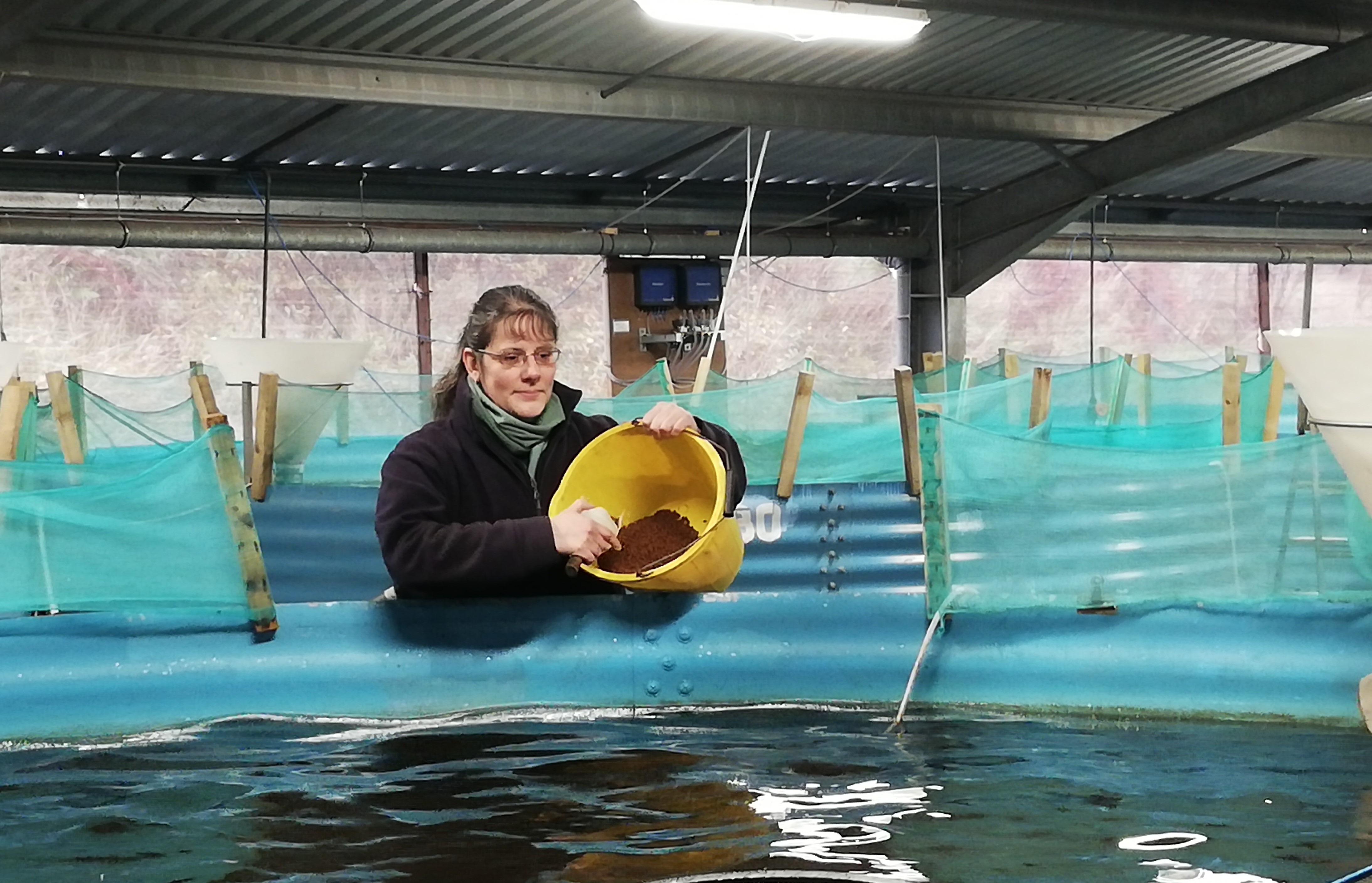
Fish, shellfish and seaweed are all ways we can help to feed our growing population, making careers in the varied world of aquaculture more important than ever before.
Aquaculture means the ‘farming’ of all kinds of animals and plants that live in the water – fish, shellfish and seaweed. Jobs in aquaculture include farming, working to restore threatened and endangered populations, habitat restoration and looking after aquariums and fish cultures. It’s a growing industry playing an important part in providing sustainable sources of protein to feed our growing population.
Scotland is Europe’s largest producer of Atlantic salmon, directly employing 2,500 people in salmon production, plus many more in the processing and supply chain. The UK also produces fish like rainbow trout, brown trout and halibut, as well as shellfish like mussels, oysters and scallops. Seaweed is also grown and harvested on a small scale – but the industry is expected to grow as we discover new ways to use seaweed in medicine, food and animal feed, and even combatting climate change.
Aquaculture is an important source of employment in the UK’s most remote, rural communities and offers career opportunities all over the world. As well as looking after animals’ health and growth, you could also specialise in science and research to make the industry more sustainable, or design new tech to reduce water pollution and feed waste.
In the Republic of Ireland, fish and shellfish are farmed in 14 Irish coastal counties; salmon, mussels and oysters are the main farmed species in the country. The industry sustains 1,833 direct jobs in remote rural areas with 80% located in the west of Ireland
Aquaculture is a varied industry with nearly 1,700 production sites across the UK
In Scotland, Atlantic salmon production dominates, employing 2,500 people directly and paying an average salary of about £38,000
Most aquaculture businesses in England, Wales and Northern Ireland are small to medium-sized enterprises (SMEs), with over 80% of businesses employing less than 5 people
There are 319 aquaculture sites in the Republic of Ireland.
In 2021, the aquaculture industry in the Republic of Ireland was valued at €175m
There are a wide range of diverse career opportunities available to you in the Aquaculture sector.
Aquaculture
Aquaculture Engineers make sure the farms and equipment on freshwater and seawater sites are operating safely and efficiently.
Aquaculture
Hatchery Managers oversee all aspects of an aquaculture hatchery including the management of the team, fish growth, infrastructure and equipment.
Aquaculture
The Head of Fish Health is responsible for planning and developing an aquaculture company’s fish health and welfare strategy.

I’ve always been interested and passionate in fish management so I am enjoying my current role at the Ardtaraig hatchery on Loch Striven. It’s a freshwater, flow-through Atlantic salmon hatchery. We receive fertilised eggs twice a year, hatch and raise them in tanks, on land until they’re ready to go to sea. We’re at the top of a loch and it’s a stunning place to work.
The main things I do each day are fish husbandry, checking equipment, monitoring feed and oxygen to the fish and grading and vaccinating them. I also have responsibilities as fire marshal, forklift operator, fish care and training new staff.
Teamwork’s really important, and you have to be good at problem solving and working independently under pressure too. We all get on really well and are a great team, so working here is rewarding.
While the honours degree in marine biology I have is relevant to my job, I wanted to do something a bit more hands-on, so was delighted to be given the chance to do a Modern Apprenticeship. It’s a great way to improve your knowledge, skills and experience while you’re still working full-time on site.
I’m learning about team and site management, aquatic production, fish feeding and health care regimes and treatments, as there’s a big focus on fish health and providing the best care that you can. You sometimes have to be prepared to cancel personal plans at short notice, because the fish always come first.
The most rewarding part of the job for me is getting feedback from the sea site how chuffed they are with the fish we produce for them. Once we know the salmon are healthy and in great condition, it makes all the hard work worth it.
Janis Brivkalns is a Marine Operative with the Scottish Salmon Company. In this short film, he explains his route into aquaculture, and tells us about his experience and training.

My name is Emmanuelle Rey, and I am Assistant Manager in a Dawnfresh Farming trout hatchery in Scotland.
I have a bachelor’s degree in marine biology from Florida Tech in the USA and the equivalent of a master’s degree in aquaculture from a French school. In 2021, I also did a modern apprenticeship level 3 qualification in aquaculture. It was interesting to see if I could still do “homework” after being out of school for so long and a challenge to convey the knowledge I got through my job to someone who does not work on my site. A good basic understanding of fish biology helped. You don’t need to be an expert but if you get the basics, then you can learn to spot when fish are unhappy.
Working in fish farming in a hatchery has always been my objective. I did not really care what fish species I would work with, just that it would be at that stage in their life. I produce delicious and healthy food so I hope I bring joy to people while they eat the trout I spent a lot of time raising.
I don’t remember when I first heard about fish farming, but I always wanted to work with fish. It seemed like the most logical thing to do, but I have no idea why, since none of my family or surrounding had any kind of interest or contact with fish, not even through recreational fishing. It is especially weird since I grew up in a city in the Alps, far away from any fish.
As the assistant manager, my duties are very eclectic and not a day is the same in my job. I do all the routine tasks, like feeding fish, cleaning tanks and keeping the farm tidy. I am also in charge of all the audits we have each year meaning I keep all our paperwork updated through the years. I keep track of all the food we use and keep track of which batch of fish eats what. When our fish health observer is on holiday, I am the back-up person who checks the fish health.
You don’t really need any previous in-depth fish knowledge to start in this field as a technician. You will learn as you work. You do need to be able to concentrate on the task at hand and to have a good coordination with the rest of the team so all the work can be done smoothly.
But if you want to advance in the job, you will need to learn about fish health and laboratory work, like using a microscope and doing bacteriology. Developing skills that have nothing to do with fish is a good idea too, like learning about maintaining electrical equipment or general maintenance so you can effect temporary repairs in an emergency.
You do need passion for the job since it is often very physical and working conditions can be tough in the rain or early in the morning.
I can’t think of another job I would prefer to do. The job is very diverse and it’s also very satisfying to see big healthy fish at the end of the production.
I am very proud of the fact that for the past couple of years pretty much all our audits have been clear, meaning that the auditors found zero non-conformance every time.
The major challenge I face in fish farming is the randomness of fish health, but you just need to take it one day at the time and go with how the fish react and follow their rhythm.
For me the concept of fish farming is “green”. Instead of depleting the wild fish stock, I raise farmed fish so that the natural stocks can be left alone. A lot of hatcheries throughout the world raise endangered species too, so fish farming can actually help in replenishing wild stock.
I work in a very isolated place, so it is very peaceful. The commute is extra short, and you are not bothered by traffic or neighbours. At the same time, I am only one hour away from Edinburgh or Glasgow so can get all the culture and shopping I need very easily.